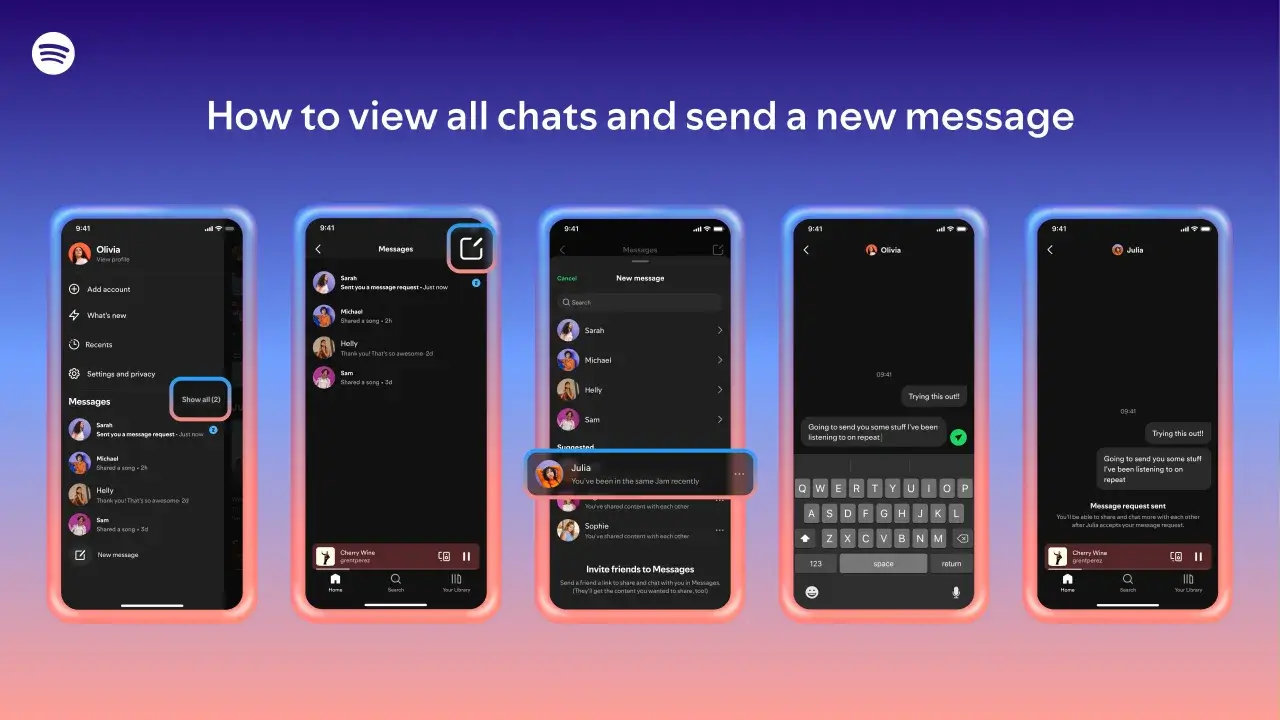Summary:
-
Spotify introduces Messages for direct messaging within the app, starting in select Latin and South American markets.
-
Users can share music, podcasts, and audiobooks, react with text and emojis, and start conversations with approved contacts.
-
Spotify stresses security and aims to enhance interactivity, while providing a new space for content sharing within the app.
Spotify is bringing conversations inside the app.
Starting this week, the company is rolling out Messages, a new direct messaging feature for Free and Premium users aged 16 and older in select Latin and South American markets.
The feature is mobile-only for now and will expand to users in the U.S., Canada, Brazil, the EU, the U.K., Australia, and New Zealand in the coming weeks.
With Messages, users can share music, podcasts, and audiobooks in one-on-one chats with friends and family, continuing a tradition of content sharing that’s long been central to the Spotify experience. Whether it’s trading playlists or sending a link to a new album, recommendations have always been part of how people discover content on the platform.
Until now, that often happened off-platform—through text, Instagram DMs, or WhatsApp. Messages is Spotify’s way of centralizing that interaction.
The feature allows users to send and receive content within the app and react using text and emojis. Conversations can be started only with users you’ve previously shared content with, such as through Blends, Jams, collaborative playlists, or shared subscription plans like Duo or Family. Users must approve message requests before a chat can begin. To access the feature, users can tap their profile picture and navigate to the new Messages section in the left-hand menu.
ADVERTISEMENT

In its official announcement, Spotify said, “Spotify users have told us they want a dedicated space within the app to share songs, podcasts, or audiobooks they’re excited about with friends and family, and an easy way to keep track of recommendations.” The company described Messages as “a fast and convenient way to share and chat about what you’re listening to with the people you care about.”
Spotify emphasized that Messages is not meant to replace content sharing on external platforms like Instagram, Snapchat, or TikTok, but to complement those tools by offering a space within the app itself. Shared content sent via other platforms will now allow recipients to approve a chat request and continue the conversation directly on Spotify. Users can also send invite links to people in their contacts.
Security was another key focus in the announcement. Spotify stated that conversations are “protected with industry-standard encryption in transit and at rest,” though the feature does not offer end-to-end encryption. Messages will be proactively scanned using detection technology for unlawful and harmful content, and flagged chats will be reviewed by moderators. Users can also report specific messages by holding them down, block accounts, or opt out of Messages entirely through their settings.
The feature arrives amid broader changes to the Spotify app, many of which are designed to increase interactivity. Last year, Spotify introduced comments for podcasts and a new video-forward feed. During a recent quarterly call, Spotify Chief Product and Technology Officer Gustav Söderström said, “The consumer mobile experience will be much more interactive,” indicating that the platform is moving toward a more socially connected listening environment.
Still, the addition of another feature raises familiar concerns among some users about the app’s evolving complexity. TechCrunch reporter Amanda Silberling, who recently switched to Apple Music, wrote, “There’s an overwhelming display of visual clutter from the time it takes to navigate from Spotify’s home page to the music you’re looking for.” Spotify’s decision to make Messages an opt-in experience may address some of that friction by giving users control over how much they engage with the feature.
ADVERTISEMENT
Spotify’s move into messaging could open new pathways for discovery, particularly for artists, authors, and podcast creators who rely on organic sharing to grow their audience. The company said, “Messages also open up new opportunities for artists, authors, and creators—more users can spread the word about an artist’s track or creator’s podcast with their friends and family, helping drive discovery.”









